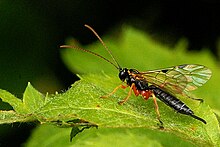Pimplinae are a worldwide subfamily of the parasitic wasp family Ichneumonidae.[1][2][3]
| Pimplinae | |
|---|---|

| |
| Tromatobia ovivora | |
| Scientific classification | |
| Domain: | Eukaryota |
| Kingdom: | Animalia |
| Phylum: | Arthropoda |
| Class: | Insecta |
| Order: | Hymenoptera |
| Family: | Ichneumonidae |
| Subfamily: | Pimplinae Wesmael, 1845 |
Pimplinae are parasitoids of Holometabola, often the pupae of Lepidoptera. Various species parasitize the egg sacs and adults of spiders.[4] Those species that parasitize eggs are ectoparasitic idiobionts. Females perforate the silk of the egg sacs and lay their egg(s) directly onto the surface of the eggs within them. After hatching, the parasitoid larvae feed externally on the eggs and kill most of the eggs in the process. [5]
Pimplinae are generally sturdy black insects with orange markings. The first tergite is box-like with the spiracle anterior to the middle.
There are 95 genera listed below.
List of genera
editDelomeristini Hellén, 1915
- Atractogaster Kriechbaumer, 1872
- Delomerista Förster, 1868
- Perithous Holmgren, 1859
Ephialtini Hellén, 1915
- Acrodactyla Haliday, 1838
- Acropimpla Townes, 1960
- Acrotaphus Townes, 1960
- Afrephialtes Benoit, 1963
- Afrosphincta Benoit, 1953
- Alophosternum Cushman, 1933
- Anastelgis Townes, 1960
- Aravenator Momoi, 1973
- Calliephialtes Ashmead, 1900
- Camptotypus Kriechbaumer, 1889
- Clistopyga Gravenhorst, 1829
- Clydonium Townes, 1966
- Dolichomitus Smith, 1877
- Dreisbachia Townes, 1962
- Endromopoda Hellén, 1939
- Ephialtes Gravenhorst, 1829
- Ephialtina Szépligeti, 1908
- Eriostethus Morley, 1914
- Eruga Townes & Townes, 1960
- Exeristes Förster, 1869
- Exestuberis Wang & Yue, 1995
- Flacopimpla Gauld, 1991
- Flavopimpla Betrem, 1932
- Fredegunda Fitton, Shaw & Gauld, 1988
- Gregopimpla Momoi, 1965
- Hemipimpla Saussure, 1892
- Hymenoepimecis Viereck, 1912
- Iseropus Förster, 1868
- Leptopimpla Townes, 1961
- Liotryphon Ashmead, 1900
- Lithoserix Brown, 1986
- Odontopimpla Cameron, 1886
- Oxyrrhexis Förster, 1868
- Pachymelos Baltazar, 1961
- Paraperithous Haupt, 1954
- Parvipimpla Gauld, 1984
- Pimplaetus Seyrig, 1932
- Piogaster Perkins, 1958
- Polysphincta Gravenhorst, 1829
- Pseudopimpla Habermehl, 1917
- Pterinopus Townes, 1969
- Reclinervellus He & Ye, 1998
- Scambus Hartig, 1838
- Schizopyga Gravenhorst, 1829
- Sericopimpla Kriechbaumer, 1895
- Sinarachna Townes, 1960
- Ticapimpla Gauld, 1991
- Townesia Ozols, 1962
- Tromatobia Förster, 1869
- Umanella Gauld, 1991
- Xanthephialtes Cameron, 1906
- Xanthophenax Saussure, 1892
- Zabrachypus Cushman, 1920
- Zaglyptus Förster, 1869
- Zatypota Förster, 1869
- Zonopimpla Ashmead, 1900
Pimplini Wesmael, 1845
- Alophopimpla Momoi, 1966
- Apechthis Förster, 1868
- Echthromorpha Holmgren, 1868
- Itoplectis Förster, 1869
- Lissopimpla Kriechbaumer, 1889
- †Parapimpla Théobald, 1937
- Pimpla Fabricius, 1804
- Strongylopsis Brauns, 1896
- Xanthopimpla Saussure, 1892
Theroniini Cushman & Rohwer, 1920
- Augerella Gupta, 1962
- Epitheronia Gupta, 1962
- Neotheronia Krieger, 1899
- Nomosphecia Gupta, 1962
- Parema Gupta, 1962
- Theronia Holmgren, 1859
Gallery
edit-
Brachyzapus nikkoensis depositing egg on a spider
-
Zatypota albicoxa depositing egg on a spider
-
Pimpla cf. rufipes
-
Dolichomitus imperator
-
Scambus buolianae
-
Acropimpla.pictipes
-
Exeristes roborator
References
edit- ^ Oehlke J. (1967): Westpaläarktische Ichneumonidae 1, Ephialtinae. Hymenopterorum Catalogus (new edition) 2: 1-49.
- ^ Townes, H.K. (1969a): Genera of Ichneumonidae, Part 1 (Ephialtinae (Pimplinae), Tryphoninae, Labiinae, Adelognathinae, Xoridinae, Agriotypinae). Memoirs of the American Entomological Institute 11: 1-300.
- ^ Gavin Broad (1966) Identification key to the subfamilies of Ichneumonidae
- ^ Takasuka, Keizo; Fritzén, Niclas R.; Tanaka, Yoshihiro; Matsumoto, Rikio; Maeto, Kaoru; Shaw, Mark R. (2018). "The changing use of the ovipositor in host shifts by ichneumonid ectoparasitoids of spiders (Hymenoptera, Ichneumonidae, Pimplinae)". Parasite. 25: 17. doi:10.1051/parasite/2018011. ISSN 1776-1042. PMC 5873220. PMID 29589827.
- ^ Fei, Minghui; Gols, Rieta; Harvey, Jeffrey A. (2023-01-23). "The Biology and Ecology of Parasitoid Wasps of Predatory Arthropods". Annual Review of Entomology. 68 (1): 109–128. doi:10.1146/annurev-ento-120120-111607. hdl:20.500.11755/8f020f3d-b12d-4d23-8c07-eae6302721b8. ISSN 0066-4170. PMID 36198401. S2CID 252736581.
External links
edit- Diagnostic characters
- Waspweb
- Ponent Images (in easy Spanish)
- Hymenoptera Online (HOL)
- Yu, Dicky Sick Ki. "Pimplinae Wesmael 1845". Home of Ichneumonoidea. Taxapad. Archived from the original on 25 March 2016.
- Taxonomicon